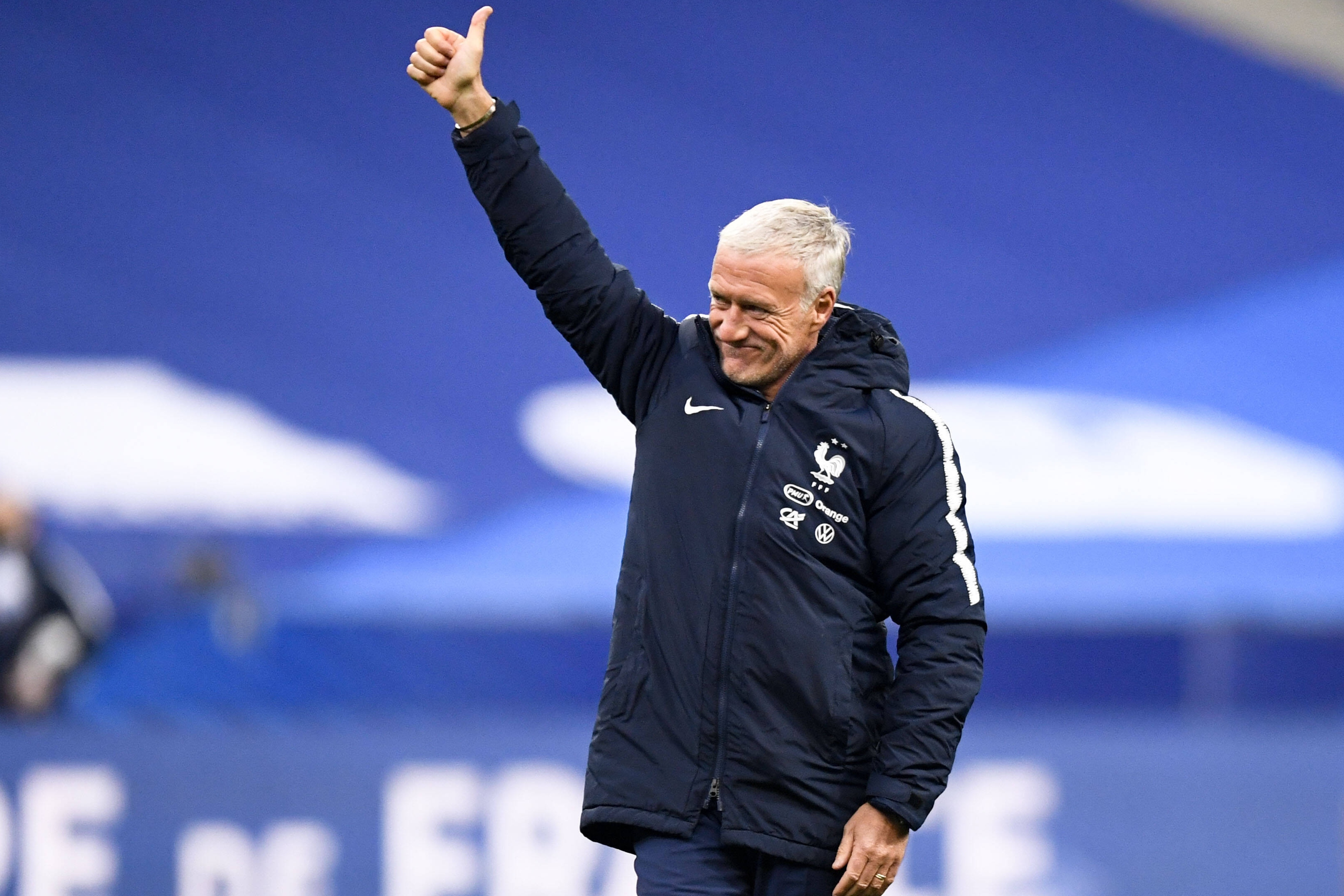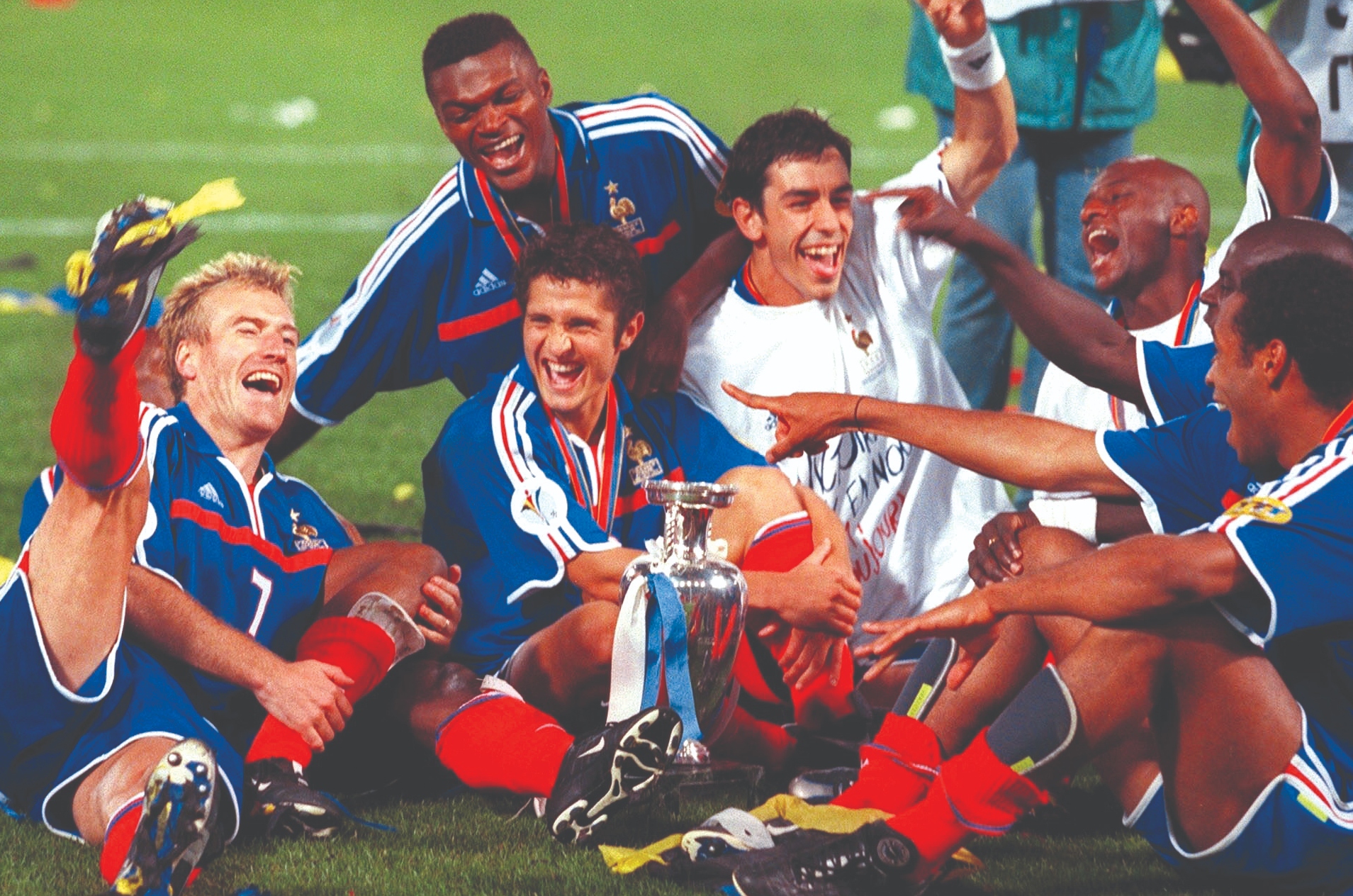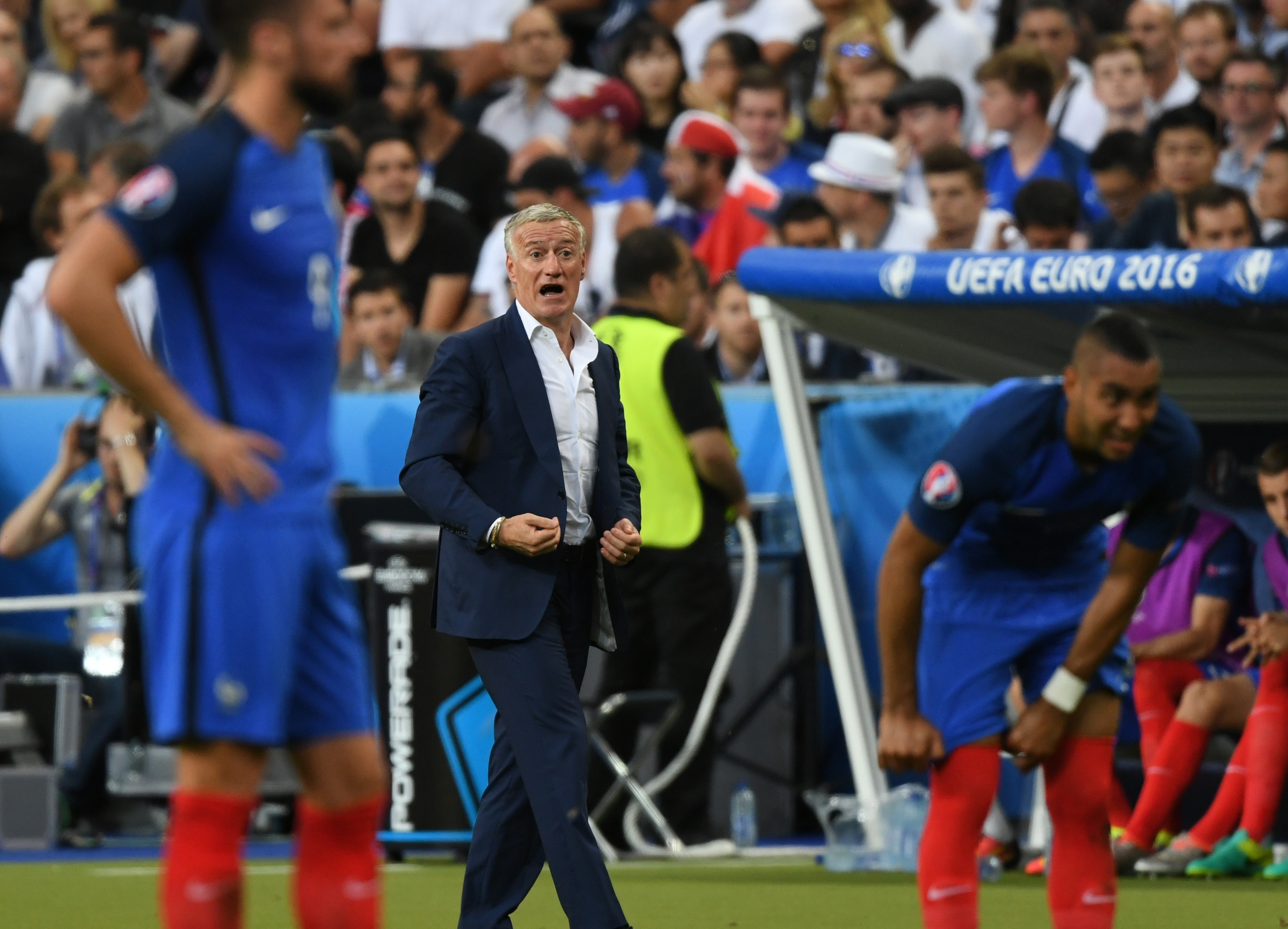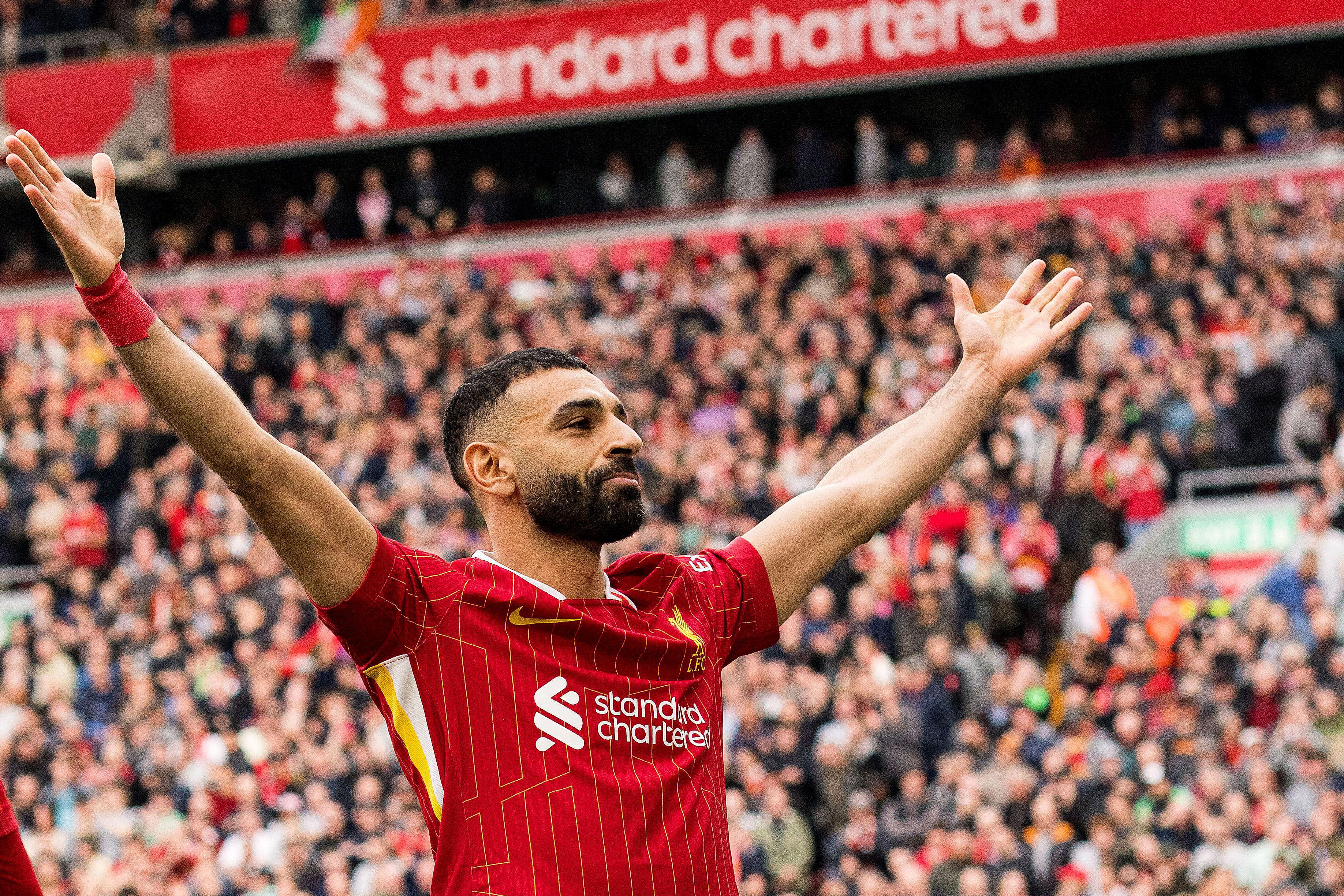Euro 2020: How Didier Deschamps and France can make history
Didier Deschamps skippered France to World Cup triumph in 1998 – then did it all over again at Euro 2000. Now, he’s on the verge of history: having steered Les Bleus to glory as a coach in 2018, ‘Dédé’ can close a perfect circle this summer. Fate is calling...

This feature on Didier Deschamps is from the Euro 2020 preview issue of FourFourTwo. Subscribe now and never miss an issue!
Didier Deschamps believes in destiny. He always has done, ever since he was a player hoovering up trophies, and then as a manager doing the same. He believes history can repeat itself, and that dates and occasions hold a special significance. For someone who’s regarded as pragmatic, that might come as a shock. But countless footballers are superstitious and Deschamps, now 52 years old, is certainly no different.
Things haven’t always worked out quite so conveniently. At Euro 2016 on home soil, there was a belief that France would win because they had always done so as hosts – in 1984, when Michel Platini inspired Les Bleus to Euros glory with one of the greatest ever individual tournament displays, then again at the 1998 World Cup. Instead, the team failed at the final hurdle in miserable circumstances against Portugal five years ago – but when destiny knocked again in 2018, Deschamps & Co unlocked the door.
Twenty years earlier, Zinedine Zidane had united a nation divided by social tensions in defeating the mighty Brazil of Rivaldo and Ronaldo with a brace in the final, giving Deschamps the honour of hoisting aloft the World Cup trophy as skipper. Two decades on, he joined the exclusive club of winners as both a player and manager, after Mario Zagallo (1958, 1962 and 1970) and Franz Beckenbauer (1974 and 1990).
In Russia, Deschamps guided Les Bleus all the way to the title with the kind of defensive doggedness that he once epitomised as a player, burnished by the emergence of Kylian Mbappe – more explosive than Thierry Henry’s in 1998, but not dissimilar either.
From 1998 to 2018: it was destiny.
The trophy carrier
In 2021, Deschamps has his eyes firmly fixed on European Championship joy. Thankfully for a man who loves symmetry and sentimental conclusions, there’s yet another opportunity to give meaning to time.
Get FourFourTwo Newsletter
The best features, fun and footballing quizzes, straight to your inbox every week.
In 2000, France followed up their maiden World Cup success with triumph at the Euros – courtesy of David Trezeguet’s thunderous golden goal against Italy in the final. Of all the great moments in his career, that one is the most significant for Deschamps.
His story with France is one of perseverance. The midfielder went through tough times before they got better: Les Bleus missed out on the 1990 World Cup, didn’t get out of the group with England at Euro 92, then failed to qualify again for USA 94, after a killer goal by Bulgaria’s Emil Kostadinov with the last kick of a devastating Parc des Princes qualifier. For ‘La Desch’, 1996 was the start, 1998 the ascent and 2000 the pinnacle.
Euro 96 was where both his and France’s adventure began. Deschamps captained the side – featuring a 24-year-old Lilian Thuram and Zidane just a few months his junior – to semi-final defeat on penalties against the Czech Republic, a June afternoon at Old Trafford that ended in heartbreak without their injured skipper. Despite the sorrow, he knew then that something was growing.
In 1996, Deschamps was at the peak of his career: 27 years old and a pivotal figure at Juventus, with whom he had recently won the Champions League final against Ajax. He would lose his next two showpieces for the Old Lady, against Borussia Dortmund (1997) and Real Madrid (1998), but at the time there was perhaps no other holding midfielder as consistent in Europe.
“People don’t realise how good he was,” his former France team-mate Robert Pires tells FourFourTwo. “He was one of the most intelligent players you would ever see and worked so hard for the team. His positioning was always perfect, he read the game so well and always anticipated where the ball would go. Then he would keep it simple – everything was always so efficient with him.”
Eric Cantona infamously nicknamed him ‘the water carrier’, but the pair have always despised one another and could have barely been more different as players or people. The truth back then, as it is now, is that ‘Dédé’ was the boss for Les Bleus. While Cantona’s inglorious international career was finished by 1995, Deschamps enjoyed a watertight relationship with head coach Aimé Jacquet, who relied upon the Juventus man to be his team’s brains, leader and ultimate voice.
His game wasn’t particularly fancy, but he was indispensable for club and country. “We couldn’t have done it without him,” admits Pires, who played with Deschamps for four years. “He knew exactly what to say before games, during them or at half-time. He was already like a manager out on the pitch, in
a different mode to the rest of us. His football brain was always switched on – he knew how every team was playing, how to exploit their weaknesses and how to nullify their strengths. He was so far ahead.”
In 2000, Deschamps was heading into his last competition for France. Like in 1998, Les Bleus kicked off as second favourites – this time behind the Dutch – though expectations had altered somewhat. Strong as they were from back to front, and more attack-minded than two years previously, the knives were being sharpened for Deschamps, who was by then 31 and under increasing pressure from 23-year-old Arsenal titan Patrick Vieira. Jacquet had departed the dugout, and his relationship with successor Roger Lemerre just wasn’t the same.
But Deschamps was still at the helm of the ship. France carved through Denmark 3-0 in their first group game, then punished 1996 nemeses the Czech Republic in the second; when their skipper was rested against the Netherlands for the group decider, they lost 3-2. Lemerre didn’t bother trying to protect his ageing leader again. In the quarter-finals against Spain, strikes from Zidane and Youri Djorkaeff sandwiched Gaizka Mendieta’s equaliser before half-time, then Raul’s fluffed last-minute penalty prevented the need for extra-time dramatics.
Not that France proved averse to such additional angst. Portugal represented their opposition in the Brussels semi-final, where Deschamps became the first player in Bleus history to reach 100 caps. Beforehand, he had fallen out with the French media amid rumours about his impending international retirement. Deschamps didn’t hold back in his criticism of the press, citing their “lack of respect and incompetence”. If only he said what he really felt.
After an insipid opening half, where France fell 1-0 behind to Nuno Gomes’ cracker, they rallied after the break. First, Henry swivelled to level things up, before extra time ended with yet another late penalty – this time to Lemerre’s men, after an alleged handball from Abel Xavier that led to furious scenes and international bans for several Selecao players. As ever, Zidane kept a cool head and made no mistake from the spot.
France, though, saved their greatest act of escapology for the final against an Italian side Deschamps knew so well. He was among the millions who considered that match lost when the Azzurri still led 1-0 deep into injury time, only for Sylvain Wiltord’s miracle goal in the 94th minute to seal another agonising spell of extra time. In sudden death territory, Trezeguet’s rifled left-footed rocket bagged the golden-goal victory.
Two years after celebrating World Cup glory, Deschamps and France had conquered Europe. After the ultimate battle – both for his country and personally – the captain sat with his final trophy in the middle of the pitch at Rotterdam’s De Kuip stadium. Alongside him were his closest allies: “brother” Marcel Desailly, with whom he had shared so much since starting out in Nantes’ youth teams; Bixente Lizarazu, a fellow Basque; Thuram and France’s younger generation: Pires, Henry and Vieira. It was like time had stopped still for a few minutes.
“It was incredible,” recalls Pires. “It almost felt like we were on our own in the world. We were just enjoying the moment, talking, laughing, joking. We were in our own bubble and Didier was being himself. He needed it because it had been a difficult competition for him, with the critics and all the pressure. But right there, he wasn’t the captain and we weren’t European Championship and World Cup winners. We were just mates who were having a great time.”

My generation, Dédé
Didier Deschamps would probably love to suspend time right now; this ideal moment where a nation holds its breath and realises it could be on the precipice of achieving something remarkable. France have another rendez-vous with destiny.
So, can this generation achieve the same feat as their boss and his iconic team-mates? A World Cup-European Championship double in any order is no minor exploit, but only West Germany (1972-1974), France (1998-2000) and Spain (2008-2010-2012) have ever done it consecutively in football history.
Twenty-one years later, it could be Antoine Griezmann & Co’s turn to add to the illustrious list. This summer, France are joint-favourites alongside England, with Belgium not too far behind in the bookies’ estimates. Realistically, Les Bleus are leading the pack – expectations are always going to be sky high when you’re the current World Cup champions, you have a serial winner as manager, Mbappe upfront, N’Golo Kanté and Paul Pogba in midfield and Raphael Varane at the heart of the defence. If on top of all that, you have a really strong team spirit; if you have more talent in every department (Griezmann, Kingsley Coman, Ousmane Dembele, Presnel Kimpembe and Tanguy Ndombele just to name a few); if you have the right combination of youth and experience, skill and physicality, you know you’ll be in a pretty strong position come the start of the tournament.
France have already formed a blueprint for success, which is essentially the same as in Russia three years ago. What happened then will still be useful for them, in the way they’ll approach the competition and how they deal with each hurdle. The principles are relatively simple: stay solid, remain well-organised and balanced within the team, work hard for one another, and then let the attacking talents work some magic.
With so much ability and flair in this squad, France could – and should – play better than they do. Their identity under Deschamps has been the subject of much debate back home, and several pundits have been tough on the head coach for his defensive style of football. Not that the man himself is too fussed. “All I care about is winning matches,” he insists, presumably resisting the urge to lob in more barbs from 2000.
Deschamps the coach was made in Italy during the ’90s, when a winning culture and mentality were stronger than anything else. He has since taught those traits to his players, who are very much on board. They don’t mind being pragmatic or ceding possession to the opposition if they have to, so long as they eventually come out on top. That strength in character is arguably their biggest quality.
He's gone on to win the #WorldCup as both captain & coach 🏆🏆But Didier Deschamps' @FrenchTeam story began #OnThisDay in 1989 with a first cap against Yugoslavia 🇫🇷☝️pic.twitter.com/X3zJvrKl5DApril 29, 2020
The parallels between the 1998-2000 era and this Deschamps team are obvious. Of all the managers Deschamps worked with as a player – the legendary Jean-Claude Suaudeau at Nantes, Marcelo Lippi at Juve, Raymond Goethals at Marseille or Hector Cuper at Valencia – Aimé Jacquet is probably the one he identifies with the most. There are certainly reflective themes: in 1998 there was one outstanding talent in Zidane, like 2018 with Mbappe; the defence was king in both tournaments, trumping star-studded attacks; in crucial games, the unlikeliest of heroes stepped up: two-goal Thuram in the 1998 semis against Croatia, before Samuel Umtiti headed home at the same stage 20 years later against Belgium.
Deschamps built his squad for 2018 in the same way that Jacquet crafted his for 1998. “You don’t pick the best 23 players in your country,” his former boss told him. “You pick the 23 who are the most likely to go furthest in the competition together.”
Jacquet left out Cantona and David Ginola in ’96, then Nicolas Anelka and Ginola (again) in ’98. Deschamps didn’t pick Karim Benzema for Euro 2016 and riled Adrien Rabiot with his rejection in 2018.
Frank Leboeuf laughs as he considers who would win a match between the two sides. He played against Brazil and Ronaldo in ’98, so is naturally biased, but what he witnessed in Russia didn’t surprise him.
“I know how Didier’s mind functions,” he explains to FFT. “He will always be cautious and conservative, but it works. It’s not just defending for the sake of it, it’s defending with a purpose, and quick transitions forward after recovering the ball. Remember, Didier chose to change everything two days before the first game against Australia in 2018 and it didn’t work, so he reverted to what he knew best. After that, the team’s performances were almost flawless in terms of what Didier demanded from them – that’s how he won the World Cup.”
The similarities go even further.
Deschamps’ conservatism played against him in the 2016 final against Portugal, where Les Bleus’ lack of a killer instinct cost them dear despite being on top. Jacquet made the same mistake in the Euro 96 semis against the Czech Republic. Both recovered from the body blow to rise again. Apart from the fact that he’s already lasted almost twice as long (nine years against five), Deschamps could almost be a Jacquet 2.0. Now he’s trying to win twice as much as his mentor.

A Blanc page
When Deschamps took over from Laurent Blanc in the summer of 2012, France were in ruins. In 2010, their players shamed the nation by going on strike during the World Cup, over a public disagreement with head coach Raymond Domenech about Anelka’s exclusion (after accusations he had insulted his manager at half-time against Mexico).
At Euro 2012, with Blanc in the hot seat, there was yet more tension – and in the end, a quarter-final exit against Spain. Five days before Deschamps was announced as the new manager, France’s football federation disciplined four players for bad behaviour at the tournament – Hatem Ben Arfa, Yann M’Vila, Samir Nasri and Jeremy Menez had been involved in internal spats that defined a group bubbling with discontent.
Deschamps’ task was enormous. While the improvement in discipline has helped, he has also benefited from an incredible era of talent coursing through French football. He handed debuts to both Pogba and Varane in 2013, and the production line has barely stopped churning out golden nuggets since.
“Didier brought a lot of confidence to the team,” reveals goalkeeper Hugo Lloris, who featured in the pre-Deschamps era and is a key cog of the current setup. “He’s amazing at man-managing the whole squad. We feel involved, everyone is committed. He gave us a structure tactically, but also off the pitch.”
Captain Lloris is to Deschamps what the latter was to Jacquet, albeit in another area of the pitch. Their trust in each other is vital. “He led us to victory in 2018 with a young squad,” the Tottenham gloveman tells FFT. “He told us to trust him, we did, and we were rewarded. Everything he said happened.”
In 2021, then, Deschamps isn’t going to change a thing. Euro 2016 proved a deep disappointment on home soil, but he had lost big finals before – three in the Champions League as a player (1997, 1998 and 2001), then one more as Monaco manager in 2004. Those who know Deschamps say he won’t make the same mistakes as five years ago against Portugal, and in 2018’s unconvincing opener against Australia.
“He always learns from his errors,” states Leboeuf. “He’s so intelligent and savvy – he knows exactly what’s good for him and for his players. Then if he has to do something radical to win, he’ll do it.”
Deschamps’ most radical act to date has been to drop Benzema for good. The debate about whether to reinstate the Real Madrid marksman surfaces regularly, but as prolific as Benzema has been over the past couple of seasons, Deschamps will never forgive him for his comments in 2016, when the forward accused his boss of “bowing to the pressure of a racist part of France” by agreeing to leave him out of his Euro 2016 squad. Benzema had been embroiled in a sex tape blackmail scandal with his former France team-mate Mathieu Valbuena, and Deschamps omitted both of them until the matter was resolved. Benzema’s accusations, though, were the end. Deschamps is a cordial personality, but can also be very stubborn. He doesn’t forget who said what and when – and he doesn’t forgive easily, either.
Les Bleus have coped perfectly well without Benzema. They are out to win a fourth major title in just over 20 years this summer, which might be the most impressive one yet. In the group stage, they take on Germany, holders Portugal and Hungary, before more difficult contests await in the knockout stages – if all goes as expected, Belgium would be their semi-final foes once again.
This should be Mbappe’s tournament; the moment where he makes his move from Next Big Thing to game-changing superstar. The 22-year-old Paris Saint-Germain flyer has matured since 2018, but opponents are far more wary of him now. He will need to adapt to how defenders deal with him.
Either way, there’s no doubt that France’s players are looking forward to this one. There won’t be too many surprises: Deschamps will keep faith with most of the men who won the World Cup three years ago, because loyalty is important to him. The value of group and unity means he would rather take a warrior such as Moussa Sissoko to the Euros than a more talented player who might not have the same mentality.
Deschamps and France won’t change, and that’s not what their rivals want to hear. On July 11, the kings of pragmatism could help their manager make history in becoming the first coach to win the World Cup and Euros as a player and manager. If that happens, it won’t just be Dédé who believes in destiny.
This article first appeared in the June 2021 issue of FourFourTwo
READ NEXT
EURO 2020 KITS New away shirts released by Adidas for Germany, Hungary, Belgium, Spain, Russia and Sweden
RICHARD JOLLY France have to be favourites for Euro 2020, despite what the bookies say
THREE LIONS SQUAD FourFourTwo writers pick who they'd take this summer
